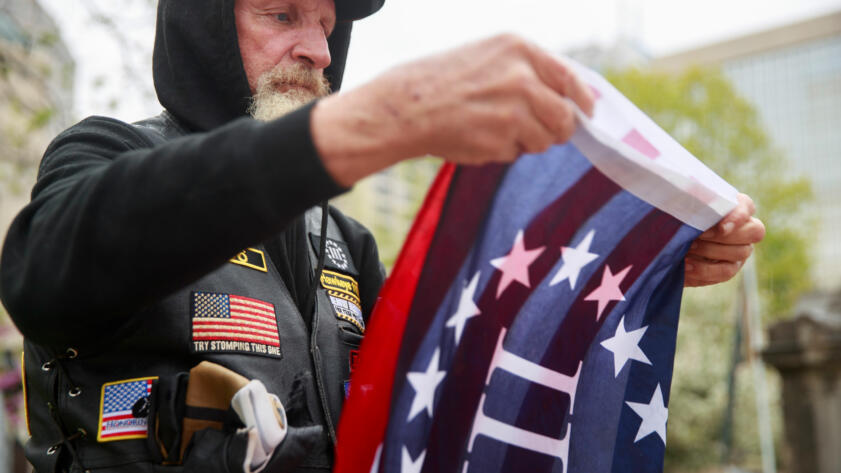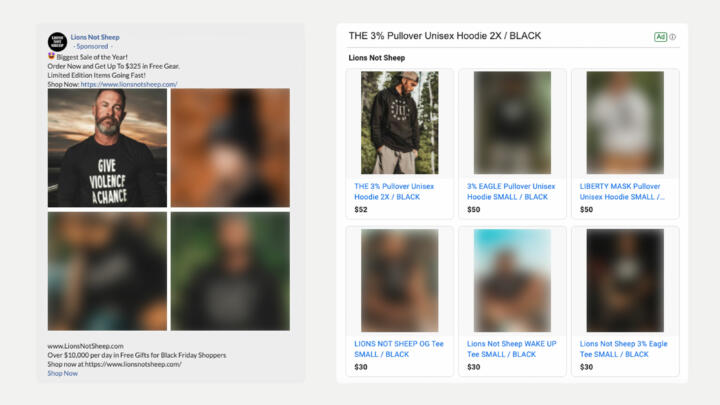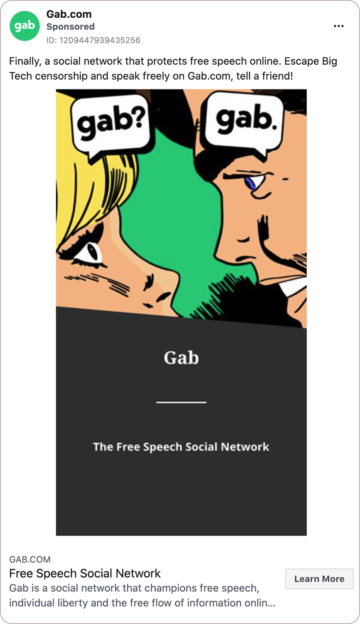Despite policies banning “militia content,” Google and Facebook both accepted ads for merchandise affiliated with a far-right militia group, the Three Percenters, over the past few months; a Google ad appeared as recently as Jan. 8. The items—shirts with logos for the militia and slogans like “Give Violence a Chance”—were also listed on Amazon, though labeled as “out of stock.”
The Google and Facebook ads both led to a website, run by a right-wing life coach named Sean Whalen, according to Whalen’s personal website. The Three Percenter shirts are no longer listed on the site, but other designs referencing violence, guns, and Antifa are available. Whalen did not respond to a request for comment.
After The Markup flagged the ads to Google and Facebook, spokespeople for both companies said those ads had, in fact, violated their rules. The ads have now been removed, they said. Cecilia Fan, an Amazon spokesperson, said that Three Percenter products listed on the site violate Amazon’s long-standing “offensive and controversial materials” restrictions. The shirt has since been taken down, but The Markup found a similar product—a tank-top with a Three Percenter logo—listed, but out of stock, on the site earlier this week.
These instances are only the latest example of companies failing to enforce their own rules, put in place to stop the sale of extremist items and the spread of misinformation, conspiracy theories, and calls to violence on their platforms. Earlier this week The Markup reported that, despite Facebook’s repeatedly pledging to stop recommending political groups to its users—a practice that its own research suggests steers people toward extremist content—the company has continued to do so.
Previously, The Markup reported that Facebook ran ads for a QAnon video-hosting website, contrary to the platform’s ban on QAnon content. And Amazon, The Markup has reported, has struggled to enforce its own product bans.
Christa Muldoon, a spokesperson for Google, said the company “immediately addressed the issue once we became aware” of The Markup’s findings.
“We removed promotions and merchandise related to Three Percenters” she said, “for their direct connections to the incitement of violence. Despite blocking this content, our enforcement systems allowed a small portion of clothing and apparel offers to run, which should not have happened.”
Google matches ads against “phrases and terms” to enforce its policy against “dangerous or derogatory” ad content, Muldoon said. And, she said, Google is “constantly monitoring for additional phrases, terms and groups” to restrict.
Liz Bourgeois, a Facebook spokesperson, said, “We’ve rejected these [Three Percenter] ads as we prohibit content from militarized social movements.”
Sen. Mark Warner, a Virginia Democrat, said, “This is a perfect example of the ways in which large technology companies are directly enabling violent extremist organizations,” adding that the issue “has received insufficient attention from policymakers.”
Google and Facebook rely largely on automated systems to sell—and police—ads that make up the vast bulk of their revenue. Amazon similarly relies largely on automation to oversee its marketplace of third-party vendors.
This is a perfect example of the ways in which large technology companies are directly enabling violent extremist organizations.
Sen. Mark Warner
Google earns 83 percent of its revenue from ads, and Facebook more than 98 percent, according to those companies’ annual reports.
Over the past year, both have, at least on paper, cracked down on incendiary content on their sites, not just in their ads. Facebook banned the QAnon conspiracy theory, along with militia groups like the Three Percenters. And facing criticism over the company’s role in enabling the rioters who stormed the Capitol earlier this month, Facebook’s chief operating officer, Sheryl Sandberg, contrasted Facebook with other platforms “that don’t have our abilities to stop hate and don’t have our standards and don’t have our transparency.”
Google, too, announced a ban last fall, on YouTube videos containing “conspiracy theory content used to justify real-world violence.” The policy Amazon’s Fan cited hasn’t been changed since 2018, and Amazon recently began interpreting it to apply to far-right militia gear.
“They have bulked up some of their policies in the last year or so,” Kayla Gogarty, a senior researcher at Media Matters, said of Facebook, “but a big problem is enforcement, especially with ads.”
The Facebook ads are not hard to find. The ads—the Three Percenters ad and the previously reported QAnon video site—targeted people whom Facebook classified as interested in Donald Trump. The Markup found the ad in a database of ads collected by the Ad Observer plugin from the Online Political Transparency Project at NYU, which enables participants to send the ads they see, plus Facebook’s explanation of the targeting, to a database. (Facebook, which does not publicly disclose its targeting choices, has repeatedly sought to shut that tool down.)
The Google ad appeared in this reporter’s Gmail inbox and on news sites across the web, via Google’s ad network; the site selling the Three Percenter merchandise targeted its ad to people who had visited the site (as this reporter did while reporting on the Facebook ad). That’s according to Google’s automated, “Why this ad?” explanation of how the ad was targeted.
Unlike the Facebook ad, which featured only a logo, the Google ad included a paragraph defining “Three Percenters” as “strongly believing in armed rebellion against perceived government overreach.”
The Three Percenters are a component of the militia movement—a collection of armed paramilitary groups holding far-right extremist views, said Alex Friedfeld, an investigative researcher at the Anti-Defamation League. “They hold this antigovernment, conspiracy-oriented ideology.” He noted that the group is focused on fighting the perceived tyranny of federal gun restrictions and doesn’t identify as white supremacist or racist.
Friedfeld said the group uses the Roman numeral “III” as a symbol, as a reference to the historically false belief that only 3 percent of American colonists fought in the Revolutionary War.
Friedfeld said people wearing Three Percenter patches were present at the violent storming of the Capitol earlier in January—and one alleged Three Percenter was charged last week—but he noted that the Three Percenter movement is decentralized, without national leaders or membership requirements.
“When places offer this kind of merchandise up for sale, and people buy it, it’s essentially advertising for these extremist movements, Friedfeld said.
Facebook also sold ads to Gab.com, a far-right social network that, as other platforms clamped down on hate speech, has become a melting pot for racist and anti-Semitic conversation. The Markup has found two advertisements for the network on Facebook since the Nov. 3 election.
Gab is a fringe social network that a 2019 study by the Anti-Defamation League called a “bastion of hatred and bigotry.” Robert Bowers, the white supremacist who murdered 11 people at the Tree of Life synagogue in Pittsburgh in 2018, announced his plan on Gab. A recent Forward investigation found numerous Gab management official accounts that made frequent anti-Semitic posts. The Gab ad was targeted at people interested in conservative Fox host Tucker Carlson.
Gab founder Andrew Torba disputed the characterization of the posts as anti-Semitic in an email to The Markup.
The Gab ad violated Facebook’s temporary ban on ads about politics put in place just before the November election, Bourgeois, the spokesperson said. She didn’t respond when asked if Facebook’s policy would allow for more Gab ads once the pause on political advertising ends. The ad has been removed since The Markup contacted the company.







